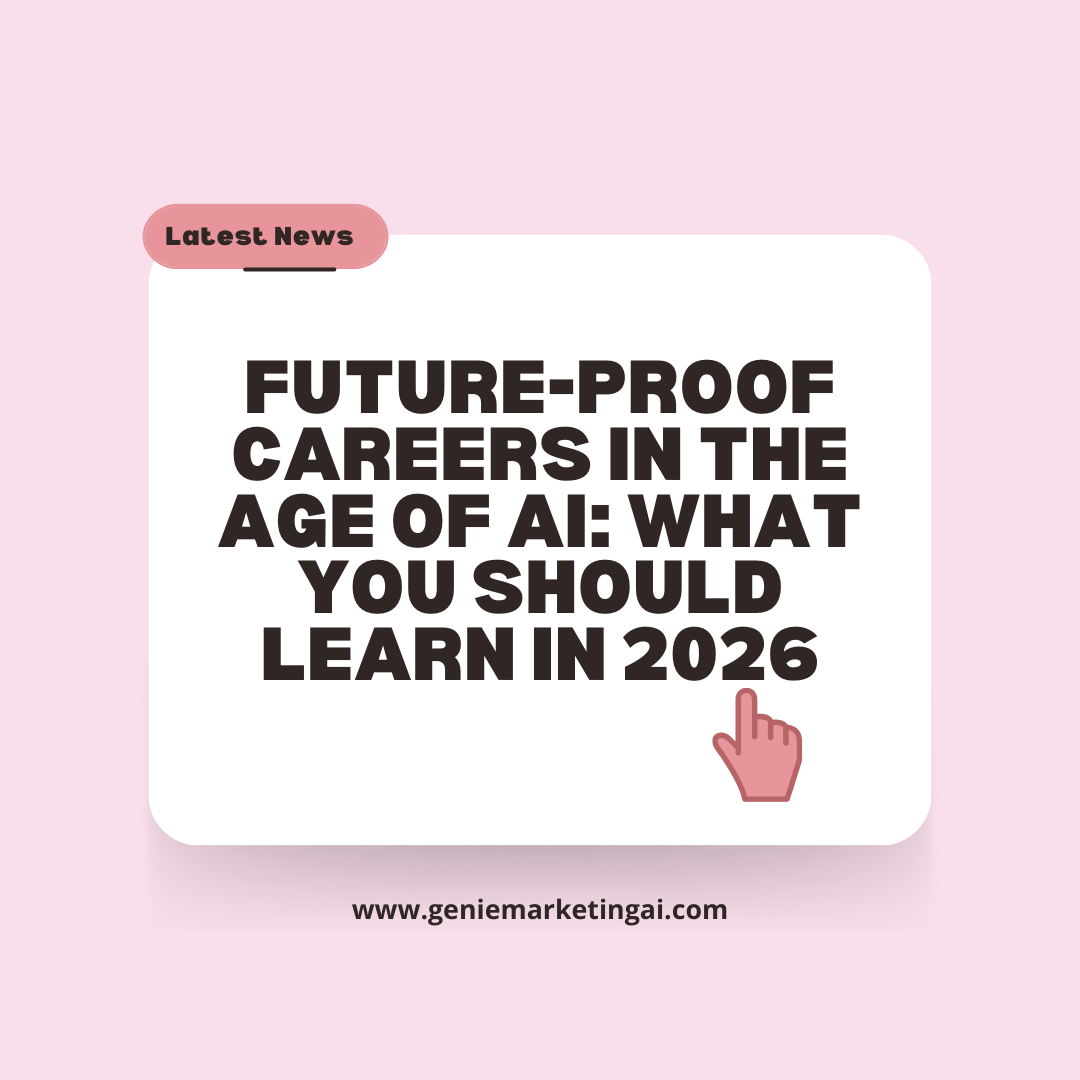Introduction: The AI Revolution and the Future of Work
Artificial Intelligence (AI) is moving faster than ever before. Just a few years ago, AI was something we mainly saw in science fiction. Today, it’s part of everyday life—powering chatbots, helping doctors diagnose illnesses, recommending what we watch on Netflix, and even writing code. By 2026, AI will play an even bigger role in how we live and work.
This rapid growth is not just about machines replacing humans in repetitive jobs. AI is actually reshaping entire industries. While some old jobs will fade away, brand-new careers are being created. The workplace is going through one of the biggest transformations in history.
So what does this mean for you? The purpose of this article is simple: to guide you on how to adapt and thrive in the AI-driven job market of 2026 and beyond. By understanding which jobs are at risk, which ones are growing, and what skills matter most, you can prepare yourself for a future where AI is everywhere.
Understanding the Impact of AI on the Job Market
Jobs at Risk: Automation and Displacement
Not all jobs are safe from automation. AI is excellent at handling tasks that are repetitive, rule-based, or involve large amounts of data. Here are a few examples of jobs most at risk:
-
Repetitive office work like data entry and basic administrative tasks.
-
Customer service where chatbots can answer common questions 24/7.
-
Bookkeeping and basic financial analysis, since AI can process numbers faster than humans.
-
Paralegal work, such as scanning through contracts or legal documents.
-
Routine journalism, like sports recaps or financial summaries.
-
Basic coding jobs, where AI tools can now generate large chunks of software.
Big research firms back this up. For example, McKinsey predicts that by 2030, up to 30% of work hours could be automated. Goldman Sachs suggests 300 million jobs worldwide may be affected. That’s huge.
But here’s the good news: while some jobs disappear, new ones are being created.
Jobs Being Created: New Opportunities
The rise of AI doesn’t just take jobs—it also creates them.
-
AI-adjacent roles: As AI grows, so does the need for people to manage it. Careers in AI ethics, governance, prompt engineering, and system maintenance are booming.
-
Human-centered roles: Skills like creativity, critical thinking, and emotional intelligence can’t be replaced by machines. Jobs that rely on human connection—like counseling, leadership, or negotiation—are becoming more important.
-
Emerging industries: Cybersecurity experts, complex researchers, and innovators in new technologies are in high demand.
So, while AI will change the job market, it also opens doors for people willing to adapt.
Essential Skills for an AI-Resilient Career in 2026
To stay ahead, you’ll need a mix of human skills (things machines can’t easily replace) and AI-adjacent skills (working with AI instead of against it).
Human-Centric Skills: The Unautomatable Edge
-
Critical Thinking and Problem Solving
Machines can process data, but humans excel at seeing the big picture and making smart choices in messy, uncertain situations. -
Creativity and Innovation
Whether it’s art, product design, or business strategy, creativity is one of the strongest shields against automation. -
Emotional Intelligence and Empathy
AI can detect emotions, but it can’t truly understand them. Careers that involve managing people, providing care, or building trust require real empathy. -
Communication and Collaboration
Explaining ideas clearly and working with teams are timeless skills. Even in an AI-heavy world, humans need to talk to humans. -
Adaptability and Lifelong Learning
The future belongs to learners, not knowers. Technology changes fast—those who can keep learning will always stay valuable.
Technical and AI-Adjacent Skills: Working with AI
-
Data Literacy and Analysis
Data is the fuel of AI. Understanding how to read, interpret, and use data is essential. -
AI Fundamentals
You don’t need to be a data scientist, but knowing the basics of machine learning and AI concepts will set you apart. -
Prompt Engineering
This is the new skill of asking AI the right questions. Good prompts lead to better results, and companies are already hiring people for this. -
Cybersecurity
As AI systems expand, protecting data and preventing cyber threats becomes even more important. -
Digital Fluency
Being comfortable with digital platforms, apps, and tools is no longer optional—it’s a requirement.
Industries and Roles Poised for Growth in the AI Era
Let’s look at where opportunities will grow the fastest:
-
Healthcare: AI can help doctors analyze scans and recommend treatments. But human doctors and nurses are still needed for empathy, patient trust, and complex decisions. Careers in personalized medicine, biotech, and healthcare AI are set to grow.
-
Education: AI can personalize lessons for students, but teachers are still vital for guiding learning, inspiring curiosity, and building character. Tutors, educational content creators, and online learning experts will thrive.
-
Creative Industries: AI can design logos or write simple music, but true storytelling, emotional art, and innovation remain human strengths. Writers, filmmakers, and designers who embrace AI as a tool—not a competitor—will succeed.
-
Strategic Leadership and Management: AI can analyze data, but leaders must make tough decisions, inspire people, and set visions. Ethical leadership in the AI age will be highly valued.
-
Research and Development: Complex problem-solving, scientific breakthroughs, and innovation can’t be fully automated. Researchers who work with AI to push boundaries will lead the future.
Strategies for Future-Proofing Your Career
Knowing what skills and industries are growing is only step one. You also need a strategy to prepare yourself.
1. Upskilling and Reskilling
Don’t stop learning. Identify the skills you’re missing and work to build them. Luckily, you don’t need a college degree for everything—online courses, certifications, and bootcamps are great ways to level up. Many employers also offer training programs, so take advantage of those.
2. Networking and Community Building
Your network is your net worth. Connect with people in your field, join online communities, attend meetups, and share your work. Opportunities often come from relationships.
3. Embracing a Growth Mindset
Instead of fearing change, see it as a chance to grow. The people who thrive in the AI era will be those who view challenges as learning opportunities.
4. Personal Branding in the AI Age
Make your unique skills visible. Share your projects, insights, and experiences online. Platforms like LinkedIn or personal blogs are great ways to stand out and attract opportunities.
Conclusion: Thriving in the AI-Powered Future
The future of work in 2026 is not about competing with machines—it’s about working with them. AI will take over some tasks, yes, but it will also open up exciting new paths for those ready to adapt.
Here are the key takeaways:
-
Routine jobs will decline, but AI-adjacent and human-centered careers will rise.
-
The most valuable skills will be critical thinking, creativity, emotional intelligence, and adaptability, alongside technical basics like data literacy and AI fundamentals.
-
Growth industries include healthcare, education, creativity, leadership, and research.
-
To future-proof your career, keep learning, build networks, stay adaptable, and showcase your unique strengths.
The outlook is bright. AI is not here to replace human potential—it’s here to amplify it. By preparing now, you can thrive in a world where humans and AI work hand in hand.
So don’t wait. Start building your AI-resilient skills today—the future is closer than you think.



Hi Neat post There is a problem along with your website in internet explorer would test this IE still is the market chief and a good section of other folks will pass over your magnificent writing due to this problem
Please install Chrome/ Microsoft Edge.
My brother suggested I might like this blog He was totally right This post actually made my day You can not imagine simply how much time I had spent for this info Thanks
Your writing has a way of making even the most complex topics accessible and engaging. I’m constantly impressed by your ability to distill complicated concepts into easy-to-understand language.
Ive read several just right stuff here Certainly price bookmarking for revisiting I wonder how a lot effort you place to create this kind of great informative website
Your blog is a beacon of light in the often murky waters of online content. Your thoughtful analysis and insightful commentary never fail to leave a lasting impression. Keep up the amazing work!
Your writing has a way of resonating with me on a deep level. I appreciate the honesty and authenticity you bring to every post. Thank you for sharing your journey with us.
Usually I do not read article on blogs however I would like to say that this writeup very compelled me to take a look at and do so Your writing taste has been amazed me Thanks quite nice post
Your writing has a way of resonating with me on a deep level. I appreciate the honesty and authenticity you bring to every post. Thank you for sharing your journey with us.
Fantastic site Lots of helpful information here I am sending it to some friends ans additionally sharing in delicious And of course thanks for your effort
Wow wonderful blog layout How long have you been blogging for you make blogging look easy The overall look of your site is great as well as the content
Wonderful web site Lots of useful info here Im sending it to a few friends ans additionally sharing in delicious And obviously thanks to your effort
I do believe all the ideas youve presented for your post They are really convincing and will certainly work Nonetheless the posts are too short for novices May just you please lengthen them a little from subsequent time Thanks for the post
Your writing has a way of making even the most complex topics accessible and engaging. I’m constantly impressed by your ability to distill complicated concepts into easy-to-understand language.